originally posted at https://canmom.tumblr.com/post/683442...
Hey friends! Today we have a very special birthday… that’s right, it’s the two year anniversary of Animation Night - the weekly film night where I try and imbue my love of animated films into a 1800kbps data stream for you to enjoy!
A year ago I wrote a recap post in which I wrote the story of the first year of Animation Night, and gave proper writeups to Aeon Flux and Tekkonkinkreet. And now, crazily, we’ve managed to pull off another year without getting banned from Twitch for weekly copyright violation. Here’s to many more!
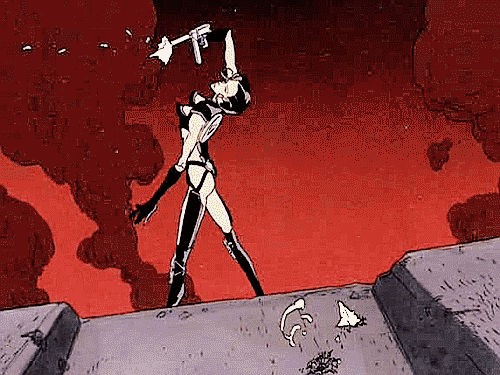
Here’s a fun fact: the first episode of Aeon Flux aired less than a month before I was born. Many, many years later I would watch a gifset on Tumblr - the one with the tooth - and get fascinated enough to watch the series. And who knows, perhaps that reawakened something… certainly it planted the seed that eventually grew into this thing.
Now then! the Animation Night Archive is gradually shaping up into its definitive version, so you should have a much easier time finding out what I’ve had to say. Features to come: a comment system (thanks to Staticman) and a detailed writeup of the Japan Animator Expo to act as an introduction to the series. Hopefully this week. But schedules do like to slip…
So, what’s another year of Animation Night brought us? Many, many things! Here’s a few lot of my favourite Animation Nights from the last year, in mostly chronological order…
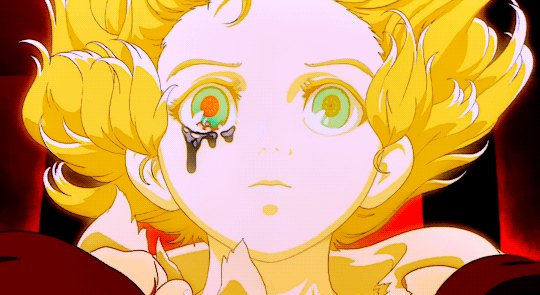
In Animation Night 53, we got to see two different renowned directors of anime tackle very similar material at the start of the new millenium. Otomo, more so than ever, created a world of sterile precision in Steamboy, a vision fascinated with the intricacies of perspective drawing and machinery yet thin on character; Rintaro took things much more experimental in Metropolis, drawing loosely on both Tezuka and Fritz Lang but very much in its own territory, to absolutely mesmerising effect…
Animation Nights 56 and 57 introduced me to Violet Evergarden, the first attempt to cram a cour of anime of anime into one night… a concept that has frequently proven, perhaps, overly ambitious. As a work of animation, Violet Evergarden is a painfully beautiful statement of KyoAni’s care and attention to detail… but as a story it’s a very odd little thing, as me n mogs ended up discussing…
For Animation Night 58, we took a virtual visit to the Annecy International Animated Film Festival. Much later, I wrote up my impressions of all the short films we watched - an incredibly striking and varied selection. I’m desperate to go to Annecy in person this year, and I just hope being on benefits now will make it affordable.
This is the year we got big into robots! Animation Night 64, fittingly, started the ball rolling with Ichiro Itano’s missile circuses and yak de culture; later we would go and explore the origins of Gundam’s very odd approach to addressing war in Animation Night 88 and 94.
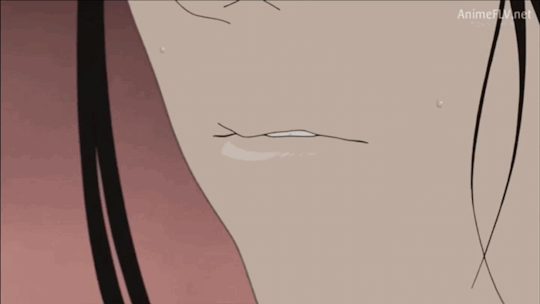
This year I learned a ton more about the theory and techniques of animation! As I approach the great mountain of becoming an animator, more and more foothills come into sight, and the journey just seems to get longer.
Yet all the same, I’m proud of my writeup for Animation Night 65 recounting, as thoroughly as I could manage, the history of rotoscopy! But of all the works we watched that night, the one that stuck with me longest is of course the most controversial: Aku no Hana (The Flowers of Evil), in which the rotoscoped style, unsettling or not, draws out all sorts of subtle tensions and uncertainties appropriate to its characters. A tragedy that it was not able to continue…
On Animation Night 66 (or if you prefer, 6.6 You Can (Not) Watch Eva), we celebrated the end of the long, long wait for the last Rebuild of Evangelion. Astonishingly, Anno and the team at Khara (and surrounding cloud of freelancers and subcontracting studios) pulled it off. At last, we have his answer to the despair expressed so powerfully in The End of Evangelion as a tight, visually striking and incredibly animated film - one that also quietly marked another step towards the successful integration of traditional and 3D animation. There is much to analyse there, but for now all I can say is, I still get a fuzzy feeling thinking back to the time we all got together to geek out about eva haha
Animation Night 68, on Brazil, turned out to be one of my absolute favourite in the entire year. We saw the early days of Brazilian animation, we saw Disney’s beautiful but superficial expression of appreciation for the country in Saludos Amigos, made against a background of union-busting and geopolitical overtures in the midst of WWII; and then we got to see the two incredible Brazilian films that dropped in 2013 acting as if an answer!
Rio 2096: A Story of Love and Fury and Boy and the World both take very different visual approaches to the same subject: the history of resistance and struggle that cuts through Brazilian history. Rio 2096 is concrete, full of historical horror and violence; Boy and the World is more abstract, packed with beautiful musical sequences, but all the more impactful as its picture becomes clear. And together they all came together into a complementary synthesis that you rarely get running a movie night like this!
I feel incredibly lucky to have seen both films lol. Animation rules.
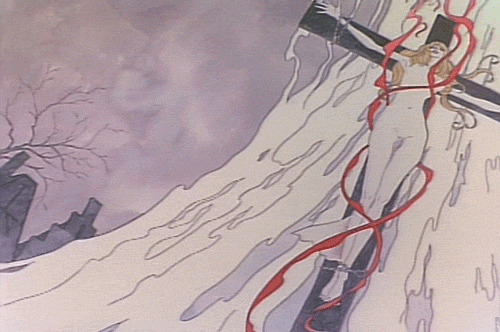
On Animation Night 69, @mogsk and I made good on the joke and wrote the most thorough history of sexuality in animation I possibly could, with a particular focus on (what else?) the development of ‘hentai’. And we watched Belladonna of Sadness, a truly incredible movie from the very end of MushiPro, and a selection of other works which deal with eroticism in ways that are touching, funny, and all the other facets of human emotion. It paid off; we had a fantastic time.
On Animation Night 70, I finally broke my ‘no big Ghibli’ rule… but of course, I started at the beginning, and wrote about Hayao Miyazaki’s career. It was fascinating to see how the elements come together: the seeds of Totoro in Panda Kopanda, the complex feelings towards militarism and nature in the episode that got Moomin cancelled… My writing seemed to strike a chord! And we would return to Miyazaki once again on Animation Night 100 when I finally showed the legendary Princess Mononoke.
Animation Night 76 we go see what the Americans were up to in the 80s while all this was going on… and the answer seems to be singing a whole lot of ballads, if the work of outsourcing experts Rankin-Bass is any guide. Return of the King landed a little awkwardly, but the gorgeous and melancholy The Last Unicorn more than made up for it.
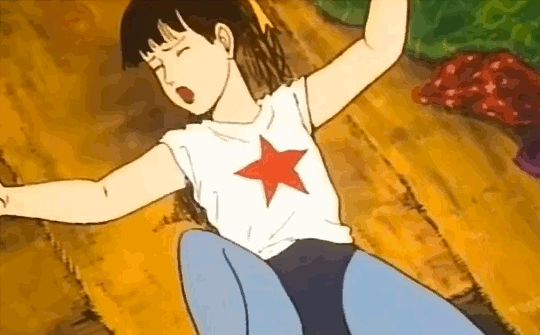
Halloween is always great, and Animation Night 77 was no exception. The Chilean stop-motion film about a Nazi cult, The Wolf House, was inventively unsettling, but the real highlight for me was the remarkable one man ero-guro film Shōjo Tsubaki, which takes the intricate manga drawings of Suehiro Maruo into limited animation to tell a strangely moving story of a circus freakshow troupe full of paraphilias. It is hard to find words to describe the mood it creates beyond ‘thoroughly fascinating’. It also, I suppose, marked the general trend towards ‘no content boundaries whatsoever’ that quickly spread to Toku Tuesday lmao.
For Animation Night 79, I was in Northern Ireland, and there I had a chance to find out about someone who seems almost unknown anywhere else: the incredibly talented John McCloskey. As impressed as I was with his command of warping and perspective in pencil, the real high point turned out to be his most recent film, An Béal Bocht (2012), a kind of darkly comic sorta-parable about the long suffering of the ‘Gaels’ and their mischievous responses that really I can only think to compare to Jewish jokes. Really incredible, and I would love for McCloskey to be wider known!
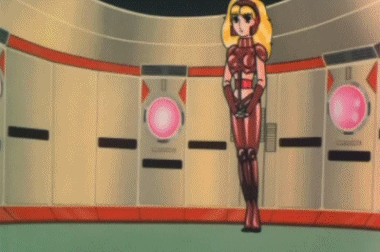
Horny old Osamu Tezuka’s place in history is well known, but going back to see the various adaptations of his Phoenix series on Animation Night 80 was another treat. Each director put their own stamp on the tragedies they were given; Tezuka’s own approach in the crazily ambitious Phoenix 2772 had that sort of delightful odd pacing and brain-bending narrative logic you can expect from his works, while Rintaro, Kawajiri and Hirata all brought the power of Madhouse to bear to tell moving stories in their own very particular ways. Fascinating excursion into anime history…
We returned to Tezuka once again on Animation Night 83, to look at his short films, which are incredibly varied in tone and endlessly experimenting in style. So we saw Hitler get killed by forest animals, a charming street corner full of anthropomorphic animals and posters destroyed by bombing, and a delightfully imaginative series of leaps across the world…
Meanwhile, on Animation Night 81, we dropped in on screenwriter and now director Mari Okada, who managed to channel an isolated childhood and tough relationship to her mother into a great deal of effective character writing. This meant seeing Maquia: When The Promised Flower Blooms, a beautiful film showing the amazing animation of veteran Toshiyuki Inoue to create a powerful novella-like story of the life of a mother and child fleeing genocide.
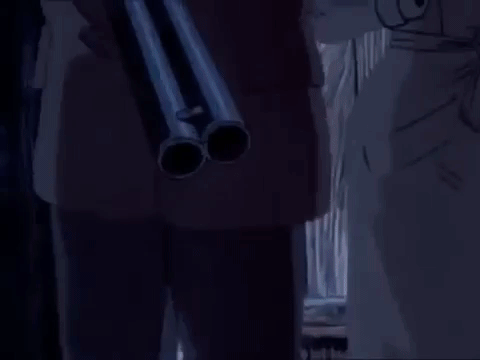
Animation Night 85, in which I looked into the (surprisingly long!) history of motion capture, was fun in a very different way, because as stupid as it may be, watching Final Fantasy: Spirits Within again in this day and age is actually a blast. The spirit of an era, indeed. Alas, the more recent works to apply the technology like Polar Express and Tintin just end up feeling overproduced and strangely empty. It turns out capturing a lifelike human performance goes much less far than you’d imagine.
On Animation Night 86, I took us to my own home country. As dreadful a blight it may be on world history, now and again Britain has found something powerful to say in animated film. I adored the terribly sad The Plague Dogs, in which two dogs escape from an animal testing lab and find themselves pursued across the country for fear they may carry disease… but alas British audiences didn’t, and it spelled the end for Martin Rosen’s brief career in realist animation. And The Wall proved everything people said it was: a blistering, incisive attack on nationalism and the machinery of social reproduction as they exist here (all the worse under Thatcher).
If I don’t manage to leave this country, I hope I can pick up the torch in attacking it.
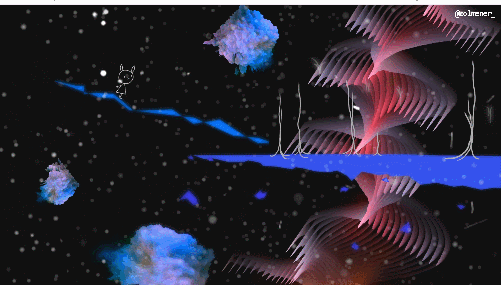
On Animation Night 89, we took on Don Hertzfeldt, and I was not prepared! I expected the sardonic humour of Rejected; I did not realise just how impactful I’d find the far-far-future science fiction existentialism of his later films. The World of Tomorrow is incredible; what else to say?
We continued the independent US animator streak on Animation Night 90, with the wide release of Jonni Phillips’s fantastic film Barber Westchester. For films about cults and social control and lack of direction in the capitalist nowhere-scape of south california, with an animation style that’s very deliberately rough, her films end are actually for the most part very wistful and beautiful (as well as frequently very funny!); Barber Westchester opened more questions than it closed in the Secrets and Lies arc, and it didn’t matter at all. Very worth the wait.

Animation Night 91 opened up what I might call the Buddhism-core segment, when we took on the ambitious plan of watching the whole of Naoko Yamada’s adaptation of the Heike Monogatari - at not KyoAni but Science Saru. The result is, honestly, one of the best anime series I’ve ever seen: at once incredibly empathetic, and insightful about the scope and impossibility of telling history; gorgeously composed with Yamada’s photographer’s eye; full of tragic inevitability and also all the stuff of life. Never have I felt more connected to people more than eight hundred years dead!
In Animation Night 92, I indulged my sword lesbian ways, and did my best to hook you all on Revue Starlight - Tomohiro Furukawa’s first statement as an heir to his mentor Ikuhara. As fun as the series is, the film really elevated it further, an exhilarating series of emotionally dense musical duels that evolve the characters and arcs of all these dramatic lesbians. A really great time.
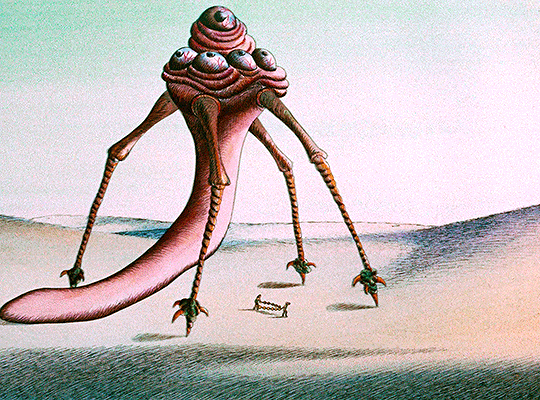
Animation Night 93, we took on the incredible René Laloux, companion to Felix Guatarri (no really!) and later, the Humanoides Association of Moebius et al. Fantastic Planet was indeed fantastic, a brilliant fusion of vivid scifi imagery with masterful Czech cutout animation, and Gandahar was captivating, but it was also a great chance to put those films in context with his earlier more experimental work with patients at La Borde Psychiatric Clinic. Really seriously fascinating guy.
In Animation Night 95, I got to fill in one of the major missing bricks in my understanding of anime history, with the wildly influential Osamu Dezaki. But more than just a history lesson, Dezaki’s work is just plain fun in every genre he tackled, shōnen to shōjo. And honestly, seeing works like Ashita no Joe really explained a lot about how anime storytelling works lol. But then of course was Space Adventure Cobra - an absolutely glorious piece of 80s gender-y scifi that felt just as Humanoides as Laloux’s films.
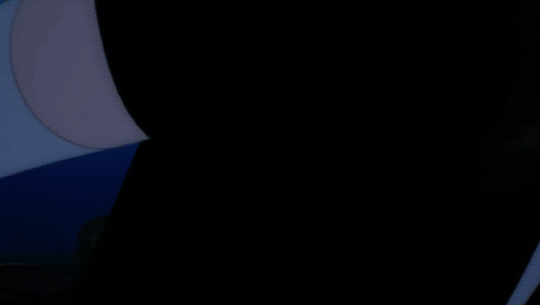
Animation Night 97 continued the Buddhism-core; I got to do a really thorough writeup on Studio Orange’s great demonstration that CG animation and traditional can compliment each other perfectly, while splendidly adapting what quickly became one of my favourite manga about the tragedy of Buddhist cosmology as experienced by nonbinary rock people.
Rounding up the Buddhism, Animation Night 98 took us to Kyōsōgiga; while the actual night hit scheduling problems, the anime itself was a delightful love letter to Kyoto and its history through some very odd family drama in an immensely inventive setting.
For Animation Night 99 we went back to the Animation Night roots, and watched a short film compilation: Blur Studio and friends’s Netflix compilation Love Death and Robots. All in all, it remained a very mixed bag that very much reflected its origins in the videogame industry: lots of technical showcases of photorealistic animation with strangely unambitious (yet hyper-gory) stories. Which is to say: perfect to watch with friends! And the incontrovertibly standout entries, primarily the work of the fantastic Robert Valley, showed us that someone has indeed taken to heart the lessons of Aeon Flux.
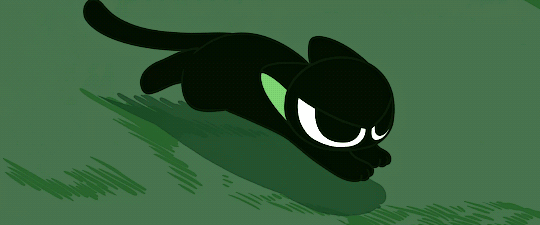
Then, two weeks ago, we returned to China for Animation Night 102, and once again found three remarkably accomplished films! New Gods: Nezha Reborn was a cyberpunk FF7-ish take on mythology as a meeting of wuxia and gangster film, with a relentless pace and fantastic choreography. The Legend of Hei took a popular cute flash series and turned it into a compelling character story about spirits at a fascinating midpoint between Miyazaki film and powers anime. Jiang Ziya followed Ne Zha with a completely different tone - less of a comedy and more a grand adventure film which really pulled out all the stops creating a visual language for a story about rejection of Heavenly authority.
And to take another recurring strand… Looking up the story of particular studios, be it Colorido (AN#72), Wit (AN#101) or even finally giving a proper account to our old friend 4C (AN#76) proved a great way to get a little cross-section of the anime industry and see particular artists evolve. And the Blender open movies (AN#78), in that vein, were a real nostalgia trip for me! I grew up using this program and over the course of my life it flourished… and those movies provide a record of that story.
…why yes, that’s almost every Animation Night we ran this year. I really like this movie night, guys!! Can you imagine there was a time where I wasn’t even that into animation? Wild.
So what’s the plan for tonight? Well, simply put, I want to go back into the archives and show some of the films from early Animation Nights that my current audience might not have had a chance to see! So that means Da Hu Fa, for one, and then perhaps a selection of short films from the first few weeks - but if you have requests for something you missed, I’ll be all ears (time permitting!)
We’ll be starting shortly, so please, if you will, come join me at the same place as ever - https://twitch.tv/canmom!
And, humbly, if you enjoyed this series and would like to help it continue and evolve, please consider supporting me on Patreon.
My baby is two years old…
Comments